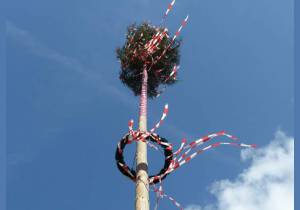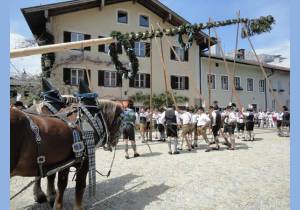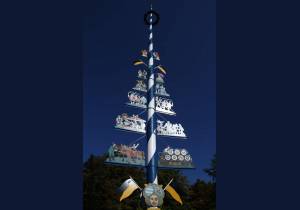Celebrating the Labor Day in Germany: dates, celebration, conventional congratulations, greetings, traditions and customs on the Labor Day, May 1
On this page you will find a description of the Labor Day festivities in Germany. Celebration dates by year, customs and traditions common for Germany on the Labor Day, May 1, a description of the origin, congratulations & greetings.
Dates for the Labor Day celebration in Germany
The date of the Labor Day celebration in Germany remains unchanged every year and falls on 1 May.
The Labor Day celebration date in Germany:
Friday 1 May 2026 .
Below is a list of dates for celebrating the Labor Day in Germany by year, provided that in previous and subsequent years the present practice and time of the holiday celebration is preserved:
- Thursday, 1 May 2025 - Labor Day, May 1 2025Germany Germany
- Friday, 1 May 2026 - Labor Day, May 1 2026Germany Germany
- Saturday, 1 May 2027 - Labor Day, May 1 2027Germany Germany
- Tuesday, 1 May 2029 - Labor Day, May 1 2029Germany Germany
Related holidays
- May Day, 1 May 2026
Other names of the holiday
Holiday name in German: 1. Mai.
Other names for the Labor Day in Germany:
- May Day
- May 1
Holiday status in the territory of Germany
Labor Day, May 1 is an extra non-working day throughout Germany – it’s a national holiday.
Wishes and congratulations, greetings on the Labor Day, May 1 in Germany
For congratulations on May 1, postcards are sold in Germany. Typical wishes for May 1:
- Schönen 1. Mai (Happy May 1st )
- Ich wünsche Euch einen wunderschönen Maifeiertag! (I wish you a wonderful May holiday)
- Schönen Maifeiertag (Happy May Day)
- Herzliche Grüße zum Maifeiertag (Warm greetings on May Day)
Description of the Labor Day celebration: customs and traditions:
May 1st in Germany is not only the International Labour Day, it is also a traditional German May holiday. Thus, in Germany, on May 1 two holidays fall at a time, although people do not attach much importance to these two events, but, like on many other holidays, they just do as is customary.
May Day in Germany
Immediately after the Walpurgis Night there comes the May Day holiday, the customs and traditions of which are associated with ancient fertility rituals (for more details regarding the origin of the holiday, see below on the page). On this day, a maypole or a May Tree (in German: Maibaum) is set up in the centre of a locality, be it a city or a village, - it is a birch or spruce cleared of bark and branches topped with a May crown, with the trunk furnished with platforms having wooden figurines placed on them here and there. Such trees can be 20-30 meters high. And the competitors are to climb the maypole.
Merry dances with ribbons tied to the maypole are given around the May Tree. Traditionally, the May Queen is chosen on this day. Different parts of Germany have other traditions that are followed on this day, for example: processions through the fields, May fish, May drink, May beer, festivities in tents or in certain streets, and many more.
Besides, on the occasion of May 1, there are discos, concerts held under the slogan "Tanz in den Mai" (dance into May), where it is also customary to wear masks or fancy-dresses. These dances take place on the night of May 1 or the Walpurgis Night.
International Labour Day in Germany
Labour Day in Germany is an official public holiday and a day off from work. For the vast majority of people, this is just a day off, dedicated to family and leisure, with no political significance.
However, political organizations, parties from time to time organize various events on this day, such as rallies or protests. Besides, this day may witness violent clashes and protests taking place in major cities of Germany.
The holidays celebrated in Germany on May 1 have totally different origins; below you will find both holidays origins description.
The origin of the Labor Day holiday
May Day holiday in Germany
Traditions and customs of the May Day holiday in Germany date back to ancient Rome, where the goddess of the earth and fertility called Maia was revered, from whom the month of May derives its name. The feast of this goddess was celebrated on May 1, on this day people organized festivities with dances and games, as well as chose the May Queen. The celebration was accompanied by processions through fields and populated localities and May greetings. The maypole, originally a birch, considered a holy tree because of its trunk colour, symbolized the goddess of fertility.
International Labour Day in Germany
The International Labour Day celebration has a common origin for all countries; it originated in the United States of America of the 19th century. Back in the 19th century, working people did not have any special rights, they worked for extremely low wages, for 10 or more hours a day, did not have the vacation privilege, and children also had to go to work. In order to eliminate this unfair situation, protests began in the United States, the first of which took place on May 1, 1886.
Later, the Congress of Paris declared May 1, 1890, the International Workers Day, which day was accompanied by demonstrations and demands put forward by the workers. Over time, this holiday has become annual and worldwide.
Photos, pictures for the holiday
To enlarge and view the picture, click on it with the mouse button.
-

Maypole or May Tree (Maibaum)
-

Setting up a maypole in a town square
-

Maypole/ May Tree variety
RU-GELD.DE Team
Last updated:


